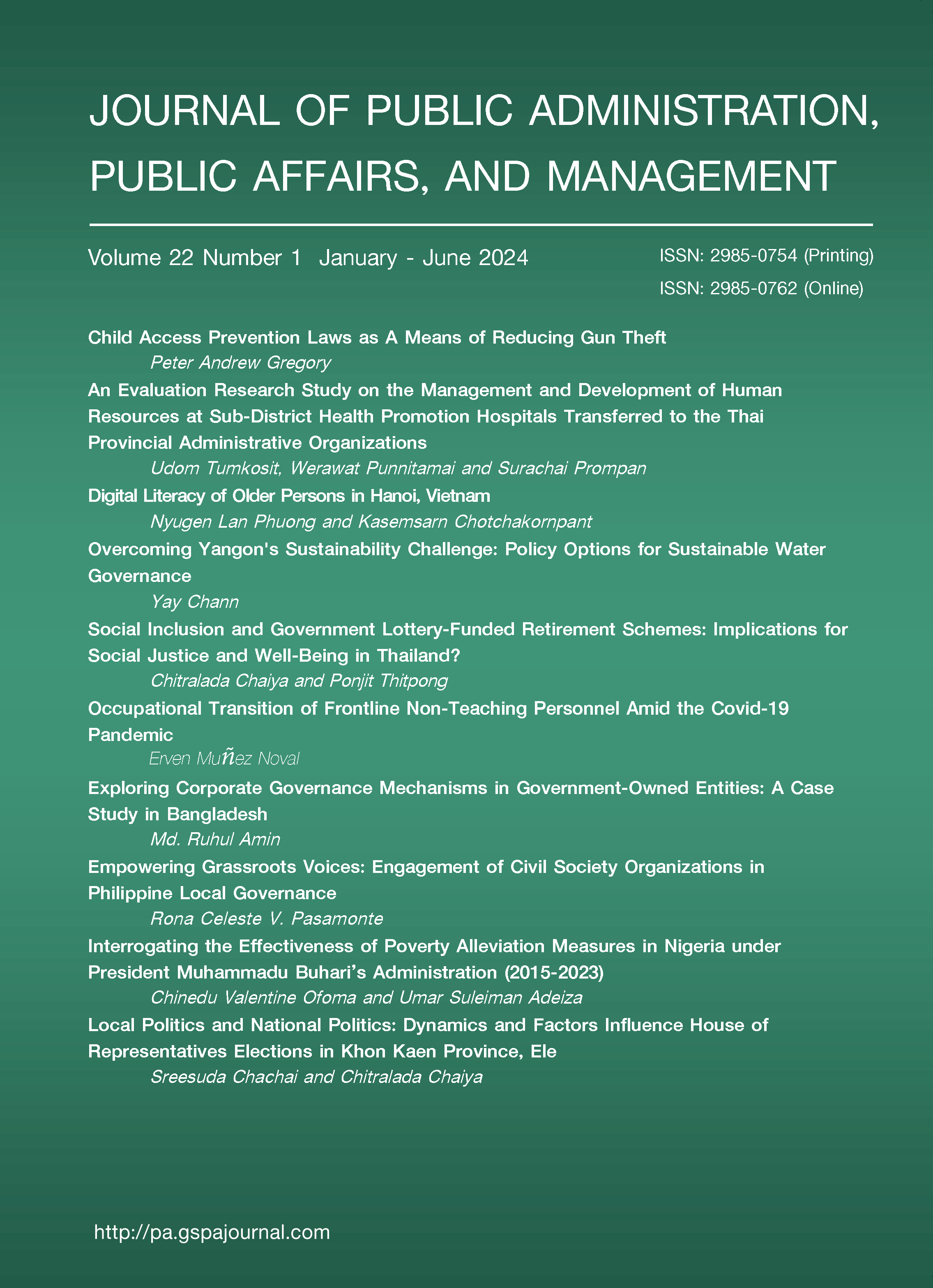Empowering Grassroots Voices: Engagement of Civil Society Organizations in Philippine Local Governance
Keywords:
Empowering grassroots voices, engagement, civil society organizations, Philippine local governanceAbstract
Civil Society Organizations (CSOs) promote inclusive governance characterized by accountability, transparency, and participation. The engagement of CSOs’ is a mechanism for citizens and government to work together to achieve development. The study used mixed methods to examine CSOs' engagement in local governance in the four functional areas of planning, budgeting, implementation monitoring, and evaluation within the Province of Bukidnon, Philippines. The results show a moderate level of engagement, with planning having the highest and monitoring and evaluation the lowest. The study reveals a discrepancy between policy and practice, implying compliance may be a stronger motivator than genuine engagement. Furthermore, specific CSO attributes like geographical location, sectors represented, organizational level and number of committees represented significantly affected their level of engagement. This study emphasizes the importance of strengthening systems that empower grassroots voices and foster meaningful collaboration, between civil society groups and local government.
References
Agosti, M. T., Andersson, I., Bringsén, A., & Janlöv, A. (2019). The importance of awareness, support, and inner strength to balance everyday life: A qualitative study about women's experiences of a workplace health promotion program in human service organizations in Sweden. BMC Women's Health, 19(1), 7. https://doi.org/10.1186/s12905-018-0704-z
Ansell, C., & Gash, A. (2008). Collaborative governance in theory and practice. Journal of Public Administration Research and Theory, 18(4), 543-571. https://doi.org/10.1093/jopart/mum032
Arnstein, S. R. (1969). A ladder of citizen participation. Journal of the American Planning Association, 35(4), 216-224. https://doi.org/10.1080/01944366908977225
Asian Development Bank. (2013). Civil Society in the Philippines. Retrieved from https://www.adb.org/sites/default/files/publication/30174/csb-phi.pdf.
Bolton, R. (2005). Habermas's theory of communicative action and the theory of social capital. Department of Economics Working Papers 2006-01. Williamstown, MA: Williams College
Clayton, A., Oakley, P., & Taylor, J. (2000). Civil society organizations and service provisions. United Nations Research Institute for Social Development. Retrieved from https://www.files.ethz.ch/isn/102665/2.pdf.
Department of the Interior and Local Government. (2018). 2018-89: Guidelines on the Engagement with CSOs in Local Governance. [Memorandum Circular].
Department of the Interior and Local Government. (2019). 2019-72: Guidelines of CSO Accreditation and Selection of a Representative to the LSB. [Memorandum Circular].
Department of the Interior and Local Government. (2021). 2021-054: Amendment to the 2021-012, on the Establishment of CSO Desk and Institutionalization of Peoples Councils in the LGU. [Memorandum Circular].
Dobson, C. (n.d.). Arnstein's Ladder of Citizen Participation. Retrieved from https://www.citizenshandbook.org/arnsteins_ladder.pdf.
Emerson, K. & Nabatchi, T. (2015). Evaluating the Productivity of Collaborative Governance Regimes: A Performance Matrix. Public Performance & Management Review, 38(4), 717-747. https://doi.org/10.1080/15309576.2015.1031016
Executive Order 93. (1993). Amending Executive Order No. 376 (1989) Establishing the Regional Project Monitoring and Evaluation System (RPMES). Retrieved from https://lawphil.net/executive/execord/eo1993/eo_93_1993.html
Gaber, J. (2019). Building "A ladder of citizen participation": Sherry Arnstein, citizen participation, and model cities. Journal of the American Planning Association, 85(3), 188-201. https://doi.org/10.1080/01944363.2019.1612267
Gouthro, P. (2002). Habermasian Theory and the Development of Critical Theoretical Discourses in Adult Education. Canada: Mount Saint Vincent University.
Guce, C. M., & Galindes, A. M. (2017). A review of citizen participation: Issues, responses, and prospects for reform in local development councils. Philippine Journal of Public Administration, 61(1 & 2), 43-70.
Gunton, T. I., & Day, J. C. (2003). The theory and practice of collaborative planning in resource and environmental management. Environments, 31(2), 5-20.
Hamzaj, E. (2015). Jürgen Habermas and the Critical Theory of the Society. Paper presented at the meeting of the 2015 WEI International Academic Conference Proceedings, University of Tirana, Albania.
Imperial, M. (2005). Using collaboration as a governance strategy: Lessons from six watershed management programs. Administration & Society, 37(3), 281–320. https://doi.org/10.1177/0095399705276111. Retrieved from https://journals.sagepub.com/doi/abs/10.1177/0095399705276111?download=true&journalCode=aasb.
Magno, F., Hecita, I. J., & Vivo, M. (2016). Institutionalizing Civil Society Participation in Local Planning, Budgeting, and Monitoring: Case Studies of Antique, Iloilo, and Misasmis Oriental (Philippines). Seaoil Foundation, The Jesse M. Robredo Institute of Governance, & De La Salle University Manila. Retrieved from https://www.academia.edu/96919684/Institutionalizing_Civil_Society_Participation_in_Local_Planning_Budgeting_and_Monitoring_Case_Studies_of_Antique_Iloilo_and_Misamis_Oriental_Philippines_.
McLaughlin, J. A., & Jordan, G. B. (1999). Logic Models: A tool for telling your program’s performance story. Evaluation and Program Planning, 22(1), 65-72. https://doi.org/10.1016/S0149-7189(98)00042-1
Michels, A. (2011). Innovations in democratic governance: How does citizen participation contribute to a better democracy? International Review of Administrative Sciences, 77(2), 275-293. https://doi.org/10.1177/0020852311399851
National Economic and Development Authority. (2023). Philippine Development Plan 2023-2028. Retrieved from https://pdp.neda.gov.ph/philippine-development-plan-2023-2028/.
Open Government Partnership. (2019). Philippines Action Plan 2019-2022 [Commitment PH0056: Citizen Participation in Local Government]. Retrieved from https://www.opengovpartnership.org/members/philippines/.
Orbista, C. (2012). NGOs Participation in Local Governance in the Philippines. Unpublished Master's Thesis, University of Canterbury.
Provincial Government of Bukidnon. (2021). Provincial Development and Physical Framework Plan 2020 – 2025. Malaybalay, Bukidnon: Philippines.
Purdy, J. M. (2012). A framework for assessing power in collaborative governance processes. Public Administration Review, 72(3), 409-417. https://doi.org/10.1111/j.1540-6210.2011.02525.x
Republic of the Philippines. (1991). An Act Providing for a Local Government Code of 1991. Retrieved from https://lawphil.net/statutes/repacts/ra1991/ra_7160_1991.html.
Republic of the Philippines. (1987). The Constitution of the Republic of the Philippines. Retrieved from https://www.officialgazette.gov.ph/constitutions/1987-constitution/.
Rosilawati, Y., Rafique, Z., Nikku, B., & Habib, S. (2018). Civil society organizations and participatory local governance in Pakistan: An exploratory study. Asian Social Work and Policy Review, 12(3), 158-168. https://doi.org/10.1111/aswp.12147
Ruvalcaba-Gómez, E. A. (2019). Open government and citizen participation: Perceptions between civil society organizations and government. JeDEM - EJournal of EDemocracy and Open Government, 11(2), 1–13. https://doi.org/10.29379/jedem.v11i2.539
United Nations General Assembly. (2015). Transforming Our World: The 2030 Agenda for Sustainable Development [Resolution]. Retrieved from https://undocs.org/en/A/RES/70/1.
Wholey, J. S. (1983). Evaluation and Effective Public Management. Boston: Little, Brown.
Williamson, T., & Rodd, J. (2016). Civil society advocacy in Nigeria: Promoting democratic norms or donor demands? BMC International Health and Human Rights, 16(19), e1-e10. https://doi.org/10.1186/s12914-016-0093-z
Yasay, D. (2018). Civil society participation as a building block of good governance: The Cagayan de Oro City, Philippines experience. ASEAN Journal of Community Engagement, 2(1). https://doi.org/10.7454/ajce.v2i1.73
Downloads
Published
How to Cite
Issue
Section
License

This work is licensed under a Creative Commons Attribution-NonCommercial-NoDerivatives 4.0 International License.



